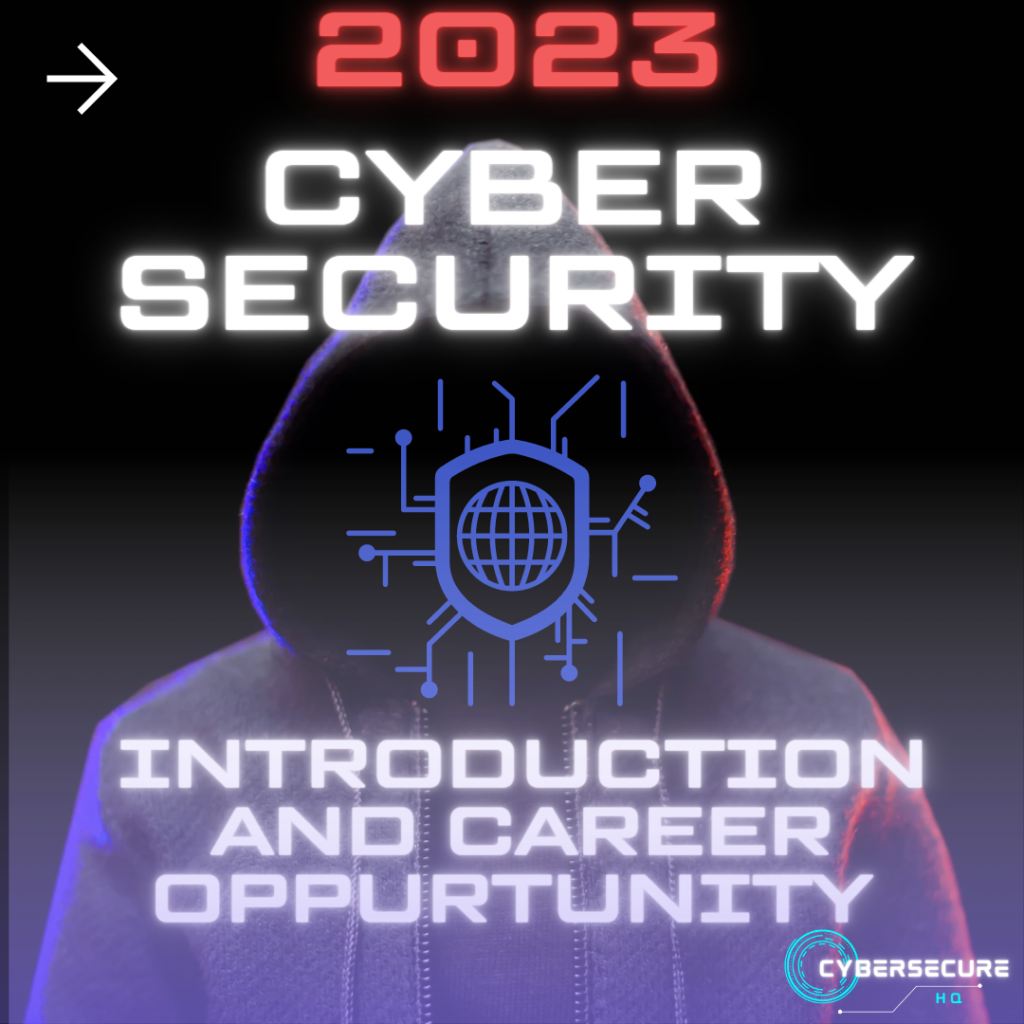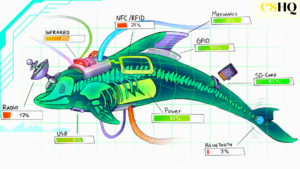What is CyberSecurity ? | Introduction and Cybersecurity Career path in 2023
Learn all about CyberSecurity and its latest trends in the industry. Recently, the Cybersecurity boom has opened up a massive and highly paying career opportunity. Click to learn all about cybersecurity here.

Cybersecurity is the practice of protecting electronic devices, networks, and sensitive information from unauthorized access, theft, or damage. It has become increasingly important as our reliance on technology continues to grow.
With the rise of the Internet of Things (IoT), cloud computing, and mobile devices, the need for cybersecurity has never been greater.
What is Cybersecurity?
Cybersecurity refers to the practice of protecting electronic devices, networks, and sensitive information from unauthorized access, theft, or damage. It includes a range of technologies, processes, and practices designed to safeguard digital assets from cyber attacks.
Cyber attacks can take many forms, including viruses, worms, Trojans, phishing, and ransomware.
Why is Cybersecurity Important?
As our reliance on technology continues to grow, the need for cybersecurity has never been greater. Cyber attacks can have serious consequences, including data loss, financial loss, reputational damage, and even physical harm.
Cybersecurity is critical to protecting sensitive information and ensuring the integrity, availability, and confidentiality of electronic devices and networks.
What are the Latest Threats in Cybersecurity : As per year 2023?
As technology continues to advance, so do the threats that come with it. Here are some of the latest updates in cybersecurity:
- Ransomware Attacks on the Rise
Ransomware attacks are becoming more common and more sophisticated. Ransomware is a type of malware that encrypts a victim’s files and demands payment in exchange for the decryption key. In some cases, the attackers threaten to publish the victim’s data if they don’t pay. These attacks can be devastating for businesses, causing them to lose valuable data and disrupting their operations.
- Phishing Scams
Phishing is a type of social engineering attack where an attacker poses as a trustworthy entity to obtain sensitive information such as usernames, passwords, and credit card details. These attacks are often carried out through email or text messages, and they can be difficult to detect. Phishing attacks can have serious consequences, including identity theft and financial loss.
- IoT Devices Vulnerabilities
The Internet of Things (IoT) refers to the network of physical devices, vehicles, and other objects that are connected to the internet. While IoT devices can be convenient and useful, they can also be vulnerable to cyber attacks. Hackers can exploit vulnerabilities in IoT devices to gain access to networks, steal sensitive information, and even cause physical harm.
- Cloud Security Concerns
Cloud computing has become increasingly popular in recent years, with many businesses and individuals storing their data and applications in the cloud. While the cloud can offer many benefits, such as flexibility and scalability, it also poses security risks. Cloud providers are responsible for securing their infrastructure, but customers are responsible for securing their own data and applications.
- Artificial Intelligence (AI) Threats
Artificial intelligence (AI) is becoming increasingly common in cybersecurity, with many companies using AI to detect and respond to threats. However, AI can also be used by attackers to carry out more sophisticated attacks. For example, attackers could use AI to generate convincing phishing emails or to bypass security systems.
How Can You Protect Yourself from Cyber Threats? Cybersecurity Best practices:
There are several steps you can take to protect yourself from cyber threats:
- Use Strong Passwords
Using strong passwords is one of the simplest and most effective ways to protect your online accounts. Make sure your passwords are at least eight characters long and include a mix of upper and lowercase letters, numbers, and symbols. Avoid using the same password for multiple accounts.
- Keep Your Software Up to Date
Software updates often include security patches that can protect your devices from cyber attacks. Make sure you keep your operating system, antivirus software, and other applications up to date.
- Be Careful What You Click On
Be cautious when opening emails or clicking on links. Phishing emails often look legitimate, so it’s important to verify the sender’s identity before clicking on any links or downloading any attachments.
- Use Two-Factor Authentication
Two-factor authentication (2FA) adds an extra layer of security to your online accounts. With 2FA, you’ll need to enter a code sent to your phone or email in addition to your password to log in to your account.
- Backup Your Data
Regularly backing up your data can help you recover from a cyber attack. Make sure you store your backups in a secure location, such as an external hard drive or cloud storage service.
- Use a VPN
A virtual private network (VPN) encrypts your internet connection and hides your IP address, making it more difficult for hackers to track your online activities. Use a VPN when accessing public Wi-Fi networks or when traveling to countries with strict internet censorship laws.
- Educate Yourself
Educate yourself about the latest cybersecurity threats and how to protect yourself from them. Attend cybersecurity training programs and workshops to learn more about the best practices and strategies to stay safe online.
Things you should know:
- Cybersecurity is a constantly evolving field, and new threats emerge all the time. It’s essential to stay up to date with the latest trends and technologies in cybersecurity and adjust your strategies accordingly. Regularly attending cybersecurity training programs and workshops can help you stay informed about the latest threats and how to protect yourself from them.
- Cybersecurity is not just for businesses and organizations. Everyone who uses electronic devices, such as computers, smartphones, and tablets, is vulnerable to cyber attacks. Therefore, it’s essential to take cybersecurity seriously and implement best practices to protect your personal data.
- Cybersecurity is a shared responsibility. While businesses and organizations are responsible for protecting their own networks and data, individuals also have a role to play in protecting themselves and others from cyber attacks. By implementing best practices and educating themselves about the latest threats, individuals can help create a more secure online environment for everyone.
- Cybersecurity is not just about technology. While technology plays a critical role in cybersecurity, it’s also important to recognize the human element. Many cyber attacks are carried out through social engineering, where attackers exploit human vulnerabilities to gain access to sensitive information. Therefore, it’s essential to educate employees and individuals about the importance of cybersecurity and how to recognize and respond to threats.
- Cybersecurity is not just about prevention. While prevention is critical, it’s also essential to have a plan in place to respond to cyber attacks if they occur. Having a well-designed incident response plan can help businesses and organizations minimize the damage caused by cyber attacks and recover more quickly.
FAQ’s of Cybersecurity:
What are the most common types of cyber threats?
Cyber threats come in many forms, but some of the most common include phishing scams, malware attacks, ransomware attacks, and DDoS (Distributed Denial of Service) attacks.
What is a phishing scam?
A phishing scam is a type of cyber attack in which an attacker poses as a trustworthy entity, such as a bank or a social media platform, and tries to trick the victim into giving away sensitive information, such as login credentials or credit card details.
What is malware?
Malware is short for malicious software, which is designed to harm or disrupt computer systems. Malware can take many forms, including viruses, trojans, and worms.
What is ransomware?
Ransomware is a type of malware that encrypts the victim’s files and demands payment in exchange for the decryption key. Ransomware attacks can be particularly devastating for businesses and organizations that rely on their data to operate.
What is two-factor authentication?
Two-factor authentication is a security measure that requires the user to provide two forms of identification, such as a password and a one-time code sent to their phone or email, to access their account. Two-factor authentication can help prevent unauthorized access to accounts even if the password is compromised.
What is a virtual private network (VPN)?
A virtual private network (VPN) is a service that encrypts the user’s internet connection and hides their IP address, making it more difficult for hackers to track their online activities. VPNs are particularly useful when accessing public Wi-Fi networks or when traveling to countries with strict internet censorship laws.
What is the dark web?
The dark web is a part of the internet that is not indexed by search engines and is only accessible through special software, such as the Tor browser. The dark web is often associated with illegal activities, such as drug trafficking and cybercrime.
What is social engineering?
Social engineering is a type of cyber attack in which the attacker manipulates the victim into divulging sensitive information or performing an action that can compromise their security. Social engineering attacks can take many forms, such as phishing scams and pretexting.
What is the Internet of Things (IoT)?
The Internet of Things (IoT) refers to the network of interconnected devices, such as smart home appliances and wearable devices, that can communicate with each other and with the internet. The IoT presents new cybersecurity challenges, as many IoT devices are not designed with security in mind and can be vulnerable to cyber attacks.
What is the role of cybersecurity in protecting personal privacy?
Cybersecurity plays a critical role in protecting personal privacy by safeguarding sensitive information, such as login credentials and financial data, from cyber attacks. Without adequate cybersecurity measures in place, personal privacy can be compromised, leading to identity theft and other forms of cybercrime.
What is the minimum qualification needed to start the career in Cybersecurity?
The minimum qualification needed to start a career in cybersecurity is typically a bachelor’s degree in a related field such as computer science, information security, or a similar area of study. However, some entry-level cybersecurity jobs may only require an associate’s degree or relevant work experience.
In addition to a degree, cybersecurity professionals also need to have a strong understanding of security concepts and technologies, as well as skills in areas such as network security, cryptography, and secure coding practices. Obtaining industry certifications such as CompTIA Security+, Certified Ethical Hacker (CEH), or Certified Information Systems Security Professional (CISSP) can also be beneficial in demonstrating knowledge and expertise in the field.
Can you get a job in cybersecurity without a degree?
Yes, it is possible to get a job in cybersecurity without a degree. While a bachelor’s degree in a related field such as computer science or information security is typically the preferred qualification, some employers may hire candidates with relevant work experience or technical skills even if they don’t have a degree.
However, without a degree, it may be more difficult to qualify for higher-level cybersecurity roles or to advance your career within the field. To compensate for the lack of a degree, you may need to have relevant certifications or demonstrate significant technical skills and knowledge through work experience or personal projects.
Obtaining industry certifications such as CompTIA Security+, Certified Ethical Hacker (CEH), or Certified Information Systems Security Professional (CISSP) can be a good way to demonstrate your knowledge and expertise in the field. Additionally, building a strong network and getting involved in the cybersecurity community can help you learn about job opportunities and make connections that can lead to a career in the field.
Cybersecurity Industry and Career Opportunities in 2023:
- What is the current state of the cybersecurity industry?
The cybersecurity industry is growing rapidly, driven by the increasing frequency and complexity of cyber threats. According to a report by Cybersecurity Ventures, global spending on cybersecurity products and services is expected to reach $1 trillion by 2025.
- What are some of the job roles in the cybersecurity industry?
The cybersecurity industry offers a wide range of job roles, including cybersecurity analyst, cybersecurity engineer, penetration tester, incident responder, and chief information security officer (CISO).
- What skills are required for a career in cybersecurity?
A career in cybersecurity requires a combination of technical skills, such as knowledge of programming languages and network security protocols, and soft skills, such as problem-solving and communication skills.
- What are the educational requirements for a career in cybersecurity?
Many cybersecurity roles require a bachelor’s degree in computer science, information technology, or a related field. Some roles may also require additional certifications, such as the Certified Information Systems Security Professional (CISSP) or Certified Ethical Hacker (CEH) certifications.
- What are the career prospects in the cybersecurity industry?
The cybersecurity industry offers strong career prospects, with many job roles in high demand and offering competitive salaries. As the importance of cybersecurity continues to grow, the demand for skilled cybersecurity professionals is expected to remain strong.
- What are some of the emerging trends in the cybersecurity industry?
Some of the emerging trends in the cybersecurity industry include the increasing use of artificial intelligence and machine learning to detect and respond to threats, the adoption of cloud-based security solutions, and the growing importance of cybersecurity in the Internet of Things (IoT) and other emerging technologies.
- How can someone start a career in cybersecurity?
To start a career in cybersecurity, it is important to gain relevant education and certifications, as well as practical experience through internships or entry-level positions. Networking and staying up-to-date with emerging trends and technologies in the industry can also help pave the way for a successful career in cybersecurity.
Career Pathways in Cybersecurity: Job Titles, Descriptions, and Required Skills
| Stage | Job Title | Job Description | Skills Required | Education Required |
|---|---|---|---|---|
| Entry Level | Security Analyst | Monitor computer networks for security threats, investigate security incidents, and implement security measures | Knowledge of security concepts, attention to detail, ability to analyze data | Bachelor’s degree in computer science, information security, or related field |
| Penetration Tester | Conduct security assessments of computer systems and networks to identify vulnerabilities and recommend improvements | Knowledge of security testing methodologies, technical skills in various operating systems and programming languages | Bachelor’s degree in computer science, information security, or related field | |
| Security Administrator | Configure and maintain security systems and policies, manage user accounts and access controls | Knowledge of security technologies and systems, troubleshooting skills | Associate’s or bachelor’s degree in computer science or information technology | |
| Mid-Level | Security Engineer | Design, implement, and maintain security systems and protocols, perform risk assessments and vulnerability testing, and respond to security incidents | Knowledge of security technologies and systems, problem-solving skills, ability to communicate technical concepts to non-technical stakeholders | Bachelor’s or master’s degree in computer science, information security, or related field, industry certifications (e.g. CISSP, CEH) |
| Security Consultant | Advise clients on security best practices, conduct risk assessments and develop security strategies, provide guidance on compliance with regulations and standards | Knowledge of security technologies and systems, analytical skills, ability to communicate technical concepts to non-technical stakeholders | Bachelor’s or master’s degree in computer science, information security, or related field, industry certifications (e.g. CISSP, CISM) | |
| Incident Responder | Investigate and respond to security incidents, analyze security logs and other data to identify the root cause of incidents | Knowledge of incident response procedures, analytical skills, ability to communicate technical concepts to non-technical stakeholders | Bachelor’s degree in computer science, information security, or related field | |
| Senior Level | Chief Information Security Officer (CISO) | Develop and implement an organization’s overall security strategy, manage security operations, and ensure compliance with regulations and standards | Strategic thinking, leadership skills, ability to manage risk, strong communication and negotiation skills | Bachelor’s or master’s degree in computer science, information security, or related field, industry certifications (e.g. CISSP, CISM), 10+ years of experience in information security |
| Security Architect | Design and implement security solutions, develop security policies and procedures, evaluate new security technologies | Knowledge of security architectures and technologies, project management skills, ability to communicate technical concepts to non-technical stakeholders | Bachelor’s or master’s degree in computer science, information security, or related field, industry certifications (e.g. CISSP, CISM) | |
| Director of Security | Lead a team of security professionals, oversee security operations, develop and implement security strategies | Leadership skills, business acumen, ability to manage risk, strong communication and negotiation skills | Bachelor’s or master’s degree in computer science, information security, or related field, industry certifications (e.g. CISSP, CISM), 10+ years of experience in information security |
Future of Career Growth in Cybersecurity:
The future of cybersecurity careers looks promising as the need for cybersecurity professionals continues to grow in response to the increasing number of cyber threats. According to the US Bureau of Labor Statistics, employment of information security analysts is projected to grow 33% from 2020 to 2030, which is much faster than the average for all occupations.
As businesses and organizations continue to adopt new technologies and move their operations online, the demand for cybersecurity professionals who can protect these systems and data from cyber threats is expected to increase. Additionally, the rise of new technologies such as cloud computing, Internet of Things (IoT), and artificial intelligence (AI) will create new challenges and opportunities in the cybersecurity field.
There is also significant room for career growth in cybersecurity. As professionals gain experience and obtain additional education and certifications, they can move up the career ladder into higher-level positions such as security architect, director of security, or chief information security officer (CISO). Additionally, cybersecurity professionals can specialize in a particular area of cybersecurity, such as penetration testing, incident response, or cloud security, to become experts in their field and advance their careers.
Overall, the future looks bright for cybersecurity professionals, and there are plenty of opportunities for career growth and advancement in the field.
Cybersecurity Trends & Statistics For 2023:
Forbes provide some context and analysis on the potential consequences for business and government from the data and growing statistics and trends in cybersecurity. Unfortunately, despite the fact that cybersecurity awareness and skills appear to be developing, the threat and complexity of cyberattacks continue to rise.
The focus needs to be on the cyber-attack surface and vectors for 2023 and beyond to figure out what can be done to reduce threats and improve resiliency and recovery. Threats also increase as consumers’ interest in them increases.
The Metaverse will become a new vector for exploitation as it becomes increasingly online. The use of artificial intelligence and machine learning in research and analytics (i.e. ChatGPT). Yet, hackers can also utilize AI technologies for sophisticated attacks.
Deep fakes are already being used, and bot activity is still rife. Also, the geopolitics of the Russian invasion of Ukraine has brought attention to the vulnerabilities of vital infrastructure to threats from nation-states, including an increase in DDS attacks on infrastructure and websites (CISA Shields Up). The hacking of a Ukrainian satellite was the most concerning.
Based on a survey by the Deloitte Center for Controllership. “During the past 12 months, 34.5% of executives who were surveyed claim that cyber attackers targeted the accounting and financial data of their firms. Of that group, 12.5% and 22%, respectively, encountered multiple similar cyber events. And “almost half (48.8%) of C-suite and other executives anticipate that the volume and size of cyber incidents aimed at the accounting and financial data of their firms would rise in the coming year.
Yet, just 20.3% of those surveyed indicated that their organization’s accounting and finance teams collaborate frequently and closely with their cybersecurity counterparts. ” A majority of executives anticipate cyberattacks on accounting and other systems. A majority of executives anticipate cyberattacks against accounting and other systems. (northbaybusinessjournal.com)





2 thoughts on “What is CyberSecurity ? | Introduction and Cybersecurity Career path in 2023”
Comments are closed.